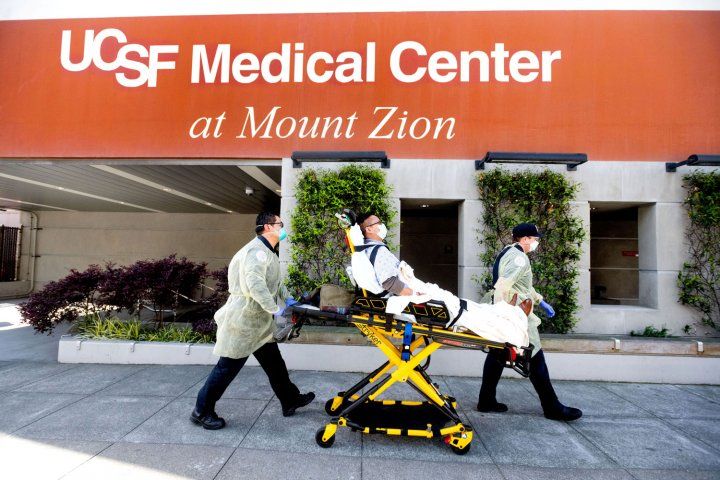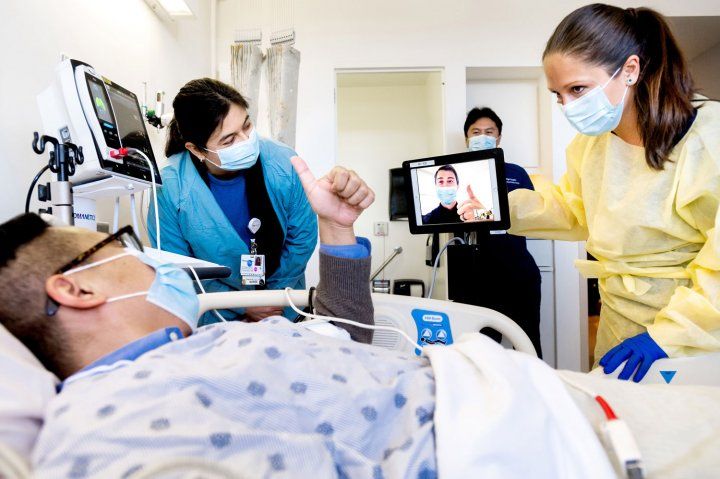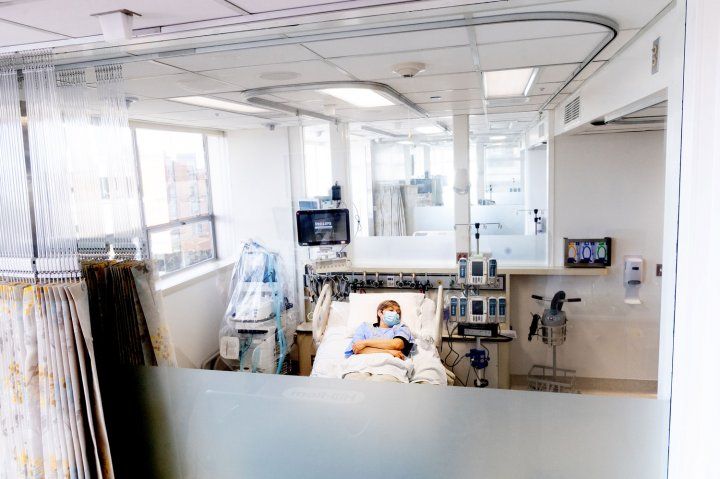UCSF Health Re-Opens Mount Zion Hospital for Inpatient Care
53-Bed Unit Enhances Access for COVID and Non-COVID Patients in Need of Treatment

Paramedics transport a mock patient into UCSF’s Mount Zion medical center during a drill. Photo by Noah Berger
UCSF Health has opened 13 acute- and critical-care beds at its Mount Zion hospital as the first phase of a new, 53-bed respiratory isolation unit that will serve as UCSF Health’s primary site for caring for patients with novel coronavirus disease.
The new ward, which began accepting patients April 29, 2020, will include 46 acute care beds and seven intensive care beds, which will be equipped with ventilators to serve the most critically ill patients. COVID-19 patients requiring more complex medical care due to co-morbidities will continue to receive care in the UCSF Helen Diller Medical Center at Parnassus Heights.
The work is part of UCSF’s long history of collaboration with the city of San Francisco and state of California to address public health crises. While San Francisco has seen a much lower surge of COVID-19 patients than expected, the new facility will play a critical role in expanding the city’s overall hospital capacity for potential future surges, while offering dedicated space for current patients.
“San Francisco has come together in a tremendous response to this pandemic, from Mayor Breed’s leadership, to our health care workers, to each member of our community who has made the sacrifice to stay home and flatten the curve of infections,” said Mark R. Laret, president and chief executive officer of UCSF Health. “We are proud to be part of that response in providing high-quality care to our Bay Area community, as well as the hospital capacity that Governor Newsom has cited as a key criteria for reopening California.”

A mock patient tests out the teleconference system at Mount Zion with the help of nurses (left to right) Lina Bandera, Ryan David, and Kristi D’Fonseca. Photo by Noah Berger
The unit also will open up valuable space at Parnassus to resume the complex neurological, cardiovascular and cancer surgeries and procedures that patients depend upon UCSF Health to provide.
In March and April, UCSF Health dramatically reduced the number of non-urgent procedures from about 70 per day to as few as 20, following directives from both the city and state to make room for the expected surge in patients with COVID-19. While essential emergency surgeries continued, patients whose procedures could be delayed without harm in the short term – including some with brain tumors, heart disorders or cancer – had to wait. These surgeries are now becoming more urgent.
“The patients who have been waiting for these specialty procedures have the potential for their disease to worsen while they wait and many have nowhere else to turn for the highly specialized care that UCSF can provide,” said Adrienne Green, MD, chief medical officer of adult services at UCSF Health. “The additional capacity for COVID patients at Mount Zion allows us to resume these increasingly urgent procedures at Parnassus, while still being prepared for the care of coronavirus patients, both now and if there is a resurgence.”
The effort to build additional inpatient capacity for coronavirus patients began in early March, when UCSF began identifying what would be required to reopen two floors of its Mount Zion hospital, which had not been used for inpatients in more than five years. In addition to revamping the ventilation system to create negative-pressure isolation rooms, the effort included installing technology to set up ventilators for the ICU beds and provide video calls from each room, converting former double-occupancy rooms into single units, installing a modern nursing call system, and reestablishing hospital food service. The numerous details included installing a window in every door and hand sanitizer dispensers outside every room.

A mock patient lies in a new respiratory isolation unit at Mount Zion during a drill. Photo by Noah Berger
“Our team came together with a goal of achieving in 43 days what normally would have taken more than six months to complete,” said Sheila Antrum, RN, who serves as both chief operating officer and chief nursing officer for UCSF Health. “This could only be achieved through strong collaboration across clinical departments, support and core services. It is a wonderful example of what we can achieve when we all work together to serve these patients.”
The expansion is part of UCSF Health’s ongoing public health response to the coronavirus pandemic, which has brought together hospitals, government agencies and others in multiple joint initiatives across San Francisco and the broader Bay Area. In March, Mayor London Breed announced a collaboration with the San Francisco Department of Public Health and the Hospital Council to open a new COVID-19 ward at Saint Francis Memorial Hospital, supported in part by UCSF Health.
Other elements of the UCSF COVID-19 response include a collaboration with the Chan Zuckerberg Institute to expand testing capabilities for the city and provide free test analysis for public health departments throughout California. UCSF also set up accelerated care units to triage emergency respiratory patients; eliminated non-urgent, elective surgeries in both the adult and children’s hospitals to expand hospital capacity, and coordinated with the City of San Francisco and the Hospital Council to identify further possibilities citywide. It has sent a total of 47 physicians and nurses to volunteer at New York Presbyterian Hospital and to the Navajo Nation, both of which have become epicenters of the pandemic.
UCSF Health is recognized worldwide for its highly innovative patient care, reflecting the latest medical knowledge, advanced technologies and pioneering research. It includes the flagship UCSF Medical Center, which is ranked among the top five hospitals nationwide, as well as UCSF Benioff Children’s Hospitals, with campuses in San Francisco and Oakland, Langley Porter Psychiatric Hospital and Clinics, UCSF Benioff Children’s Physicians and the UCSF Faculty Practice. These hospitals serve as the academic medical center of the University of California, San Francisco, which is world-renowned for its graduate-level health sciences education and biomedical research. UCSF Health has affiliations with hospitals and health organizations throughout the Bay Area. Visit www.ucsfhealth.org.